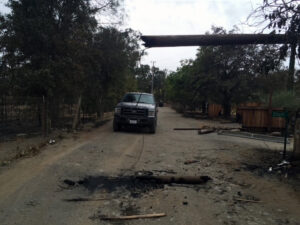What to do when an emergency situation occurs

Animal Owners need to be aware of what they should do to be ready for an evacuation situation WHEN one occurs.
The best way for you and your family to be safe during a disaster is to create a plan, drill the plan on Red Flag Days, and leave early if you can. One of the main reasons people fail to evacuate is a reluctance to leave animals behind.
Resources
1. SELF-EVACUATE. Self-evacuate to a pre-arranged location of a friend, relative, acquaintance or boarding stable. Evacuate your family, including your animals, as early as possible. By leaving early, you will decrease the chance of becoming a disaster victim yourself. Refer to page 22 in the AVMA “Saving the Whole Family Booklet” (opens the AVMA page in a new window). If you have not already done so, sign up for the Nixle alerts.
2. FOLLOW YOUR NEIGHBORHOOD EVAC PLAN. If you are involved with or have set up a neighborhood evacuation plan then this is the time to get in contact with those in your organization who can help you.
3. SHELTER-IN-PLACE. If you and your animals must stay, know how to shelter-in-place. There are things you can do for yourself and your animals to have the best outcome.
4. Follow the Napa CART Facebook page (opens in new window) and website for for updated disaster resources.
5. DEALING WITH HEAT ILLNESS during a fire (opens a PDF in a new window).
Additional Resources
Pet and Animal Emergency Planning
Review the Napa CART Individual Disaster Preparedness Presentation for an outline of preparedness planning information (PDF opens in a new window).
Does your family’s emergency plan include your animals? Planning and preparation are critical when it comes to protecting the health of your family, pets and livestock. Napa CART has lists of recommended items for your Pet and Home Emergency Kits (PDF opens in a new window).
Our own Napa County provides a website dedicated to emergency preparedness (opens in a new window) and directions for creating Disaster Planning and First Aid Kits (opens website in a new window) for large and small animals.
UC Davis Veterinary Medicine International Animal Welfare Training Institute (opens website in a new window) provides a number of training opportunities and online resources at their website. Of particular note, see the UC Davis Center for Equine Health Horse Report regarding disaster preparedness for horse owners (opens PDF in a new window).
The Department of Homeland Security’s Ready.gov website (opens in a new window) has an entire section devoted to emergency planning for your pets and animals.
The Center for Disease Control and Prevention also provides helpful information on Pet Safety in Emergencies (website opens in a new window).